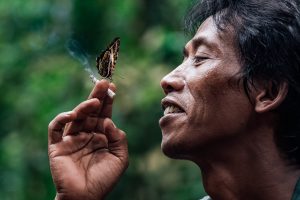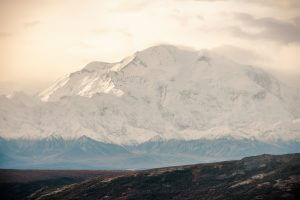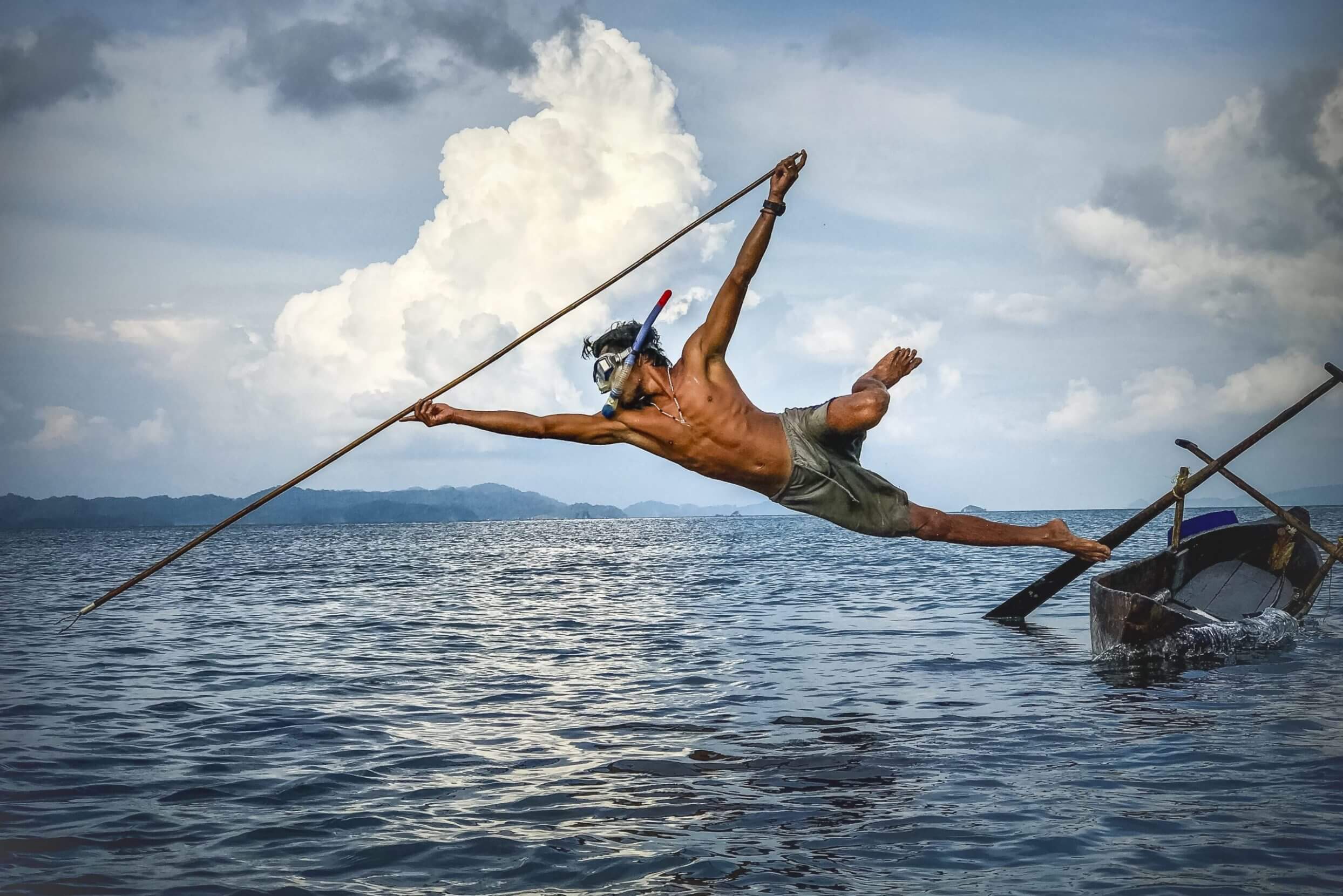
A Moken man dives spear-first into the sea off Myanmar. For thousands of years, the Moken roamed these waters, living on longboats and fishing for each meal. Now, their culture is disappearing. PHOTO: TANIA AMOCHAEV ROMANOV.
Abeautifully muscled body soars to the apex of a majestic leap, painting a perfect arc over my head. Clouds billow in the late afternoon sun and light glints on the sea. The diver’s long spear touches the water and a moment later he’s gone. Only an empty dugout canoe bobs in the water next to me. Standing in a small dinghy, I balance my weight to absorb the rocking, and wait for the freediving Moken fisherman to reappear.
~~
We had raised anchor at four in the morning, heading for the village of Ma Kyone Galet, on a tiny spit of land off the southern coast of Myanmar. Somewhere along the way, near a mangrove swamp, an encounter awaited with the sea nomads known as the Moken and their traditional kabangs, or longboats.
Or so we thought.
But the Moken evaded us as we sailed across constantly changing seas.
They were wayfarers, nomads, roamers who shifted their homes when the environment forced a change. The very name Moken means “drowned in the sea” in their language, and it seems the original people were driven from land centuries ago by the Mon, a famed tribe of artists and architects. At the edges of Mon culture were people who were unable to continue fighting for their territory and who were too restless to adapt — people who escaped to uninhabited islands and waterways.
For thousands of years, the Moken wandered the Andaman Sea among islands that lie off the coast of today’s Myanmar and Thailand. They traveled in kabangs with woven palm frond covers big enough to sleep and cook under. And they had a deft way of leaping from the bow, spear first, into deep waters, to reemerge with a fish for their next meal.
Moken didn’t teach their children how to dive, or how to see underwater, or how to hold their breath for longer than seems possible. They passed their knowledge on through instinct.
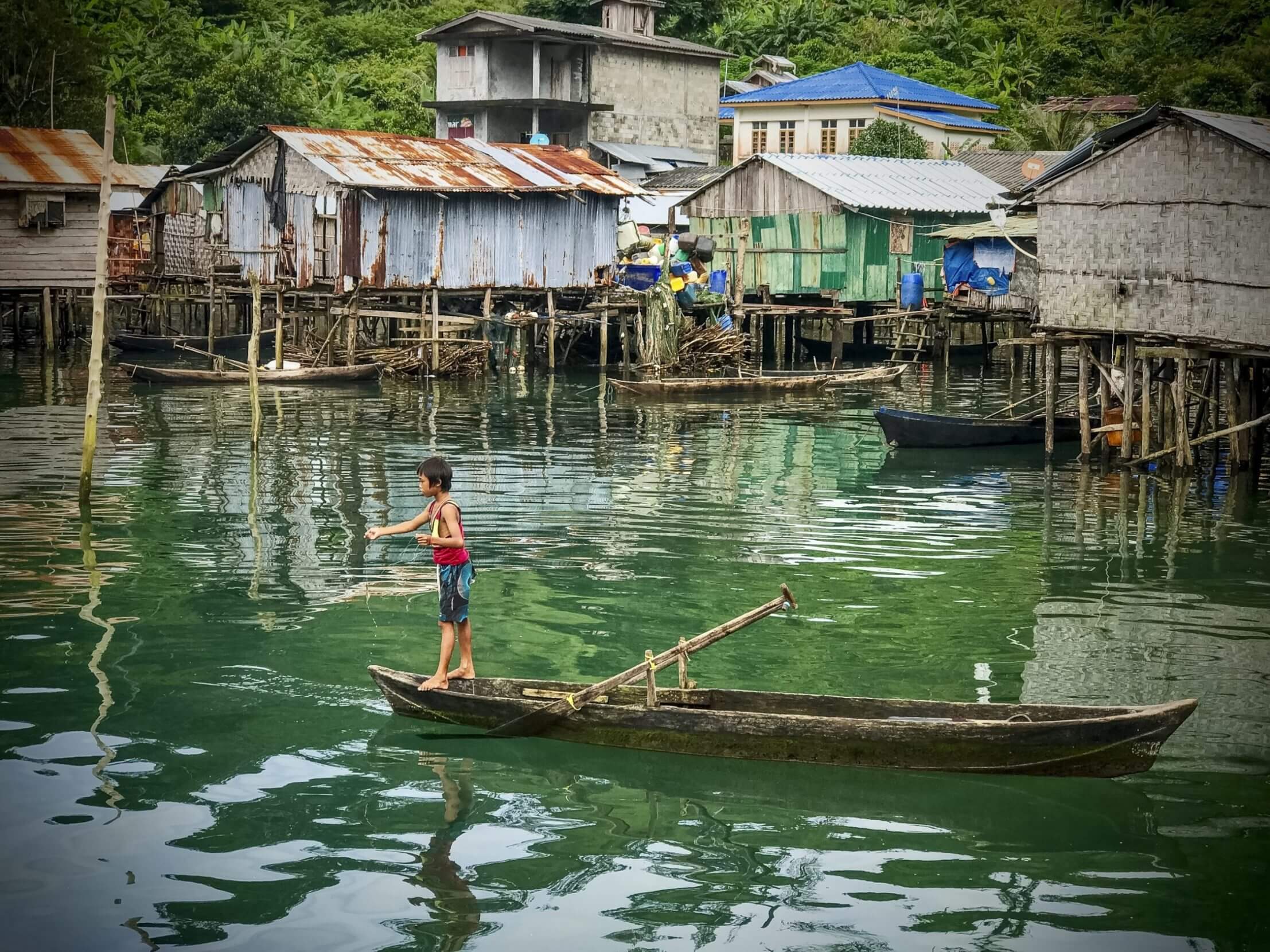
A Moken boy fishes while balancing on the bow of a dugout canoe. PHOTO: TANIA AMOCHAEV ROMANOV.
When the tsunami of 2004 hit their homeland, their instincts taught them to react. The Moken knew that waters departing from the shores meant something powerful was coming. They ran to the hills and many survived.
The tsunami, however, ruined boats and structures, and sped up the disintegration of their way of life. Then large motorized fishing boats came from far away to these rich waters, ignoring laws and fishing indiscriminately, robbing more Moken of their livelihoods. The last authentic nomadic kabang in the region had been abandoned some ten years before my visit.
Searching for these nomads of the waters, we finally understood that we would not find them at sea, for the Moken were hidden in plain sight.
On land.
By late afternoon we approached Ma Kyone Galet, originally planned as a model Moken village at the edge of a natural park — a way to help the Moken adjust to losing the freedom of the seas. But they struggled to survive, and tourists, like the nomads, continued to be elusive in Myanmar. We saw none in those waters.
Eventually Ma Kyone Galet became a mixed community of a few hundred people — as big a metropolis as can be found in the area. Today more than half of the residents are Burmese, and the cultures are weaving together, although the Moken still primarily live in homes built on stilts over the water, tethering their boats to their houses and merging the worlds of sea and land.
The first thing we saw as we approached were dugout canoes with tiny children rowing out toward us. It was pouring rain, but they were determined in their onslaught. We were charmed. But they were mostly after the crew’s gifts of instant noodles and canned sodas.
The tide was far out as I jumped into the broad shallows of a rock-strewn shore. Footing was tenuous because hidden currents flowed between the shore and the nearby mangrove swamps, but the scene proved irresistible. My feet sank in the shifting sands, my waterproof sneakers retained the water that flooded in, and my knees found the hidden sharp rocks as I knelt for perspective.
Beached longboats and dugout canoes lay scattered around me, their shapes reflected in the wet sands.
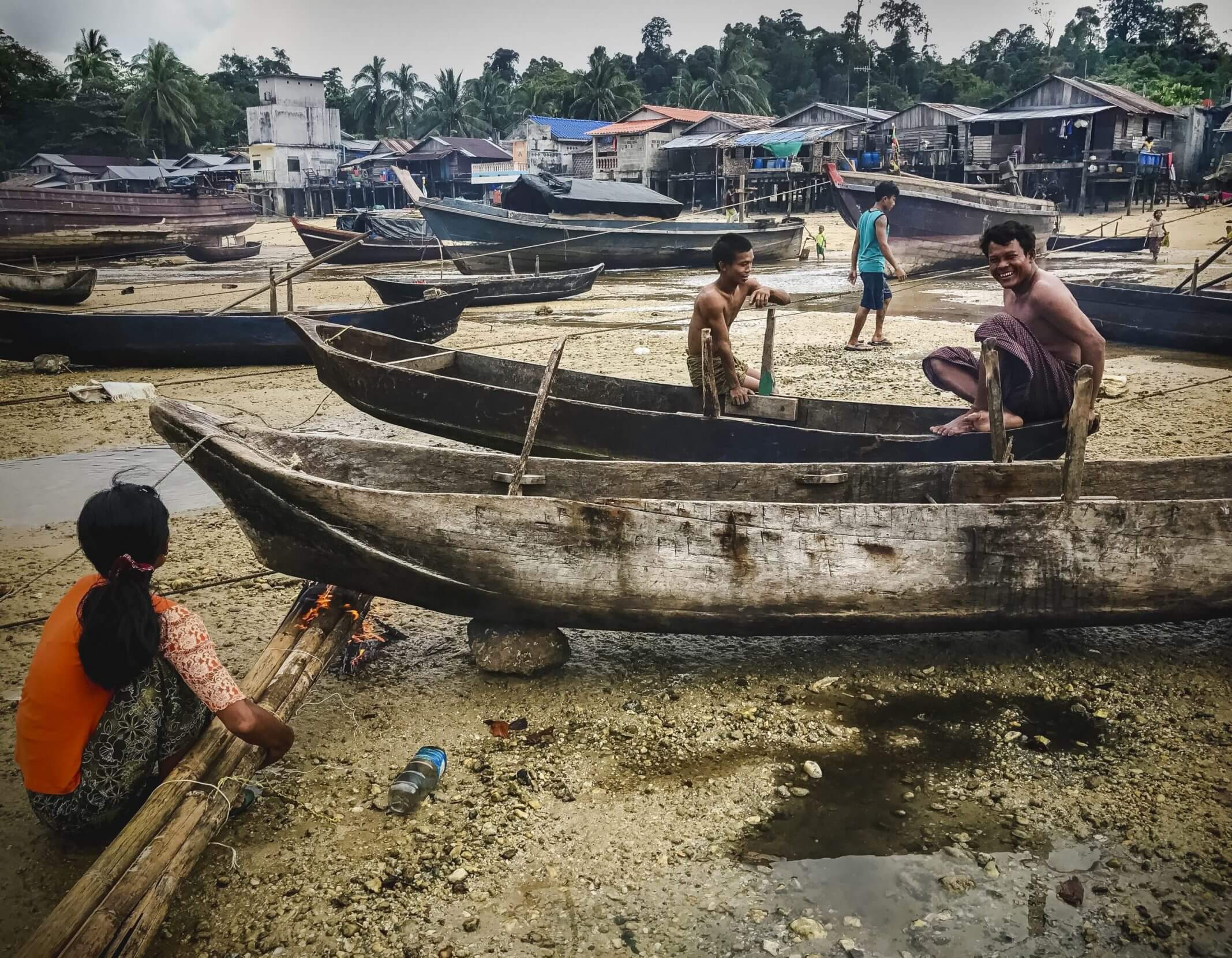
Moken residents of Ma Kyone Galet tend to their canoes and longboats on shore. PHOTO: TANIA AMOCHAEV ROMANOV.
Dramatic clouds covered the sky, and smoke filled the air. Some of the boats were deeply entrenched, perhaps permanently. Their wood had no need for artful aging. Long contact with salt water guaranteed a rustic patina. The Moken’s very survival required constant maintenance.
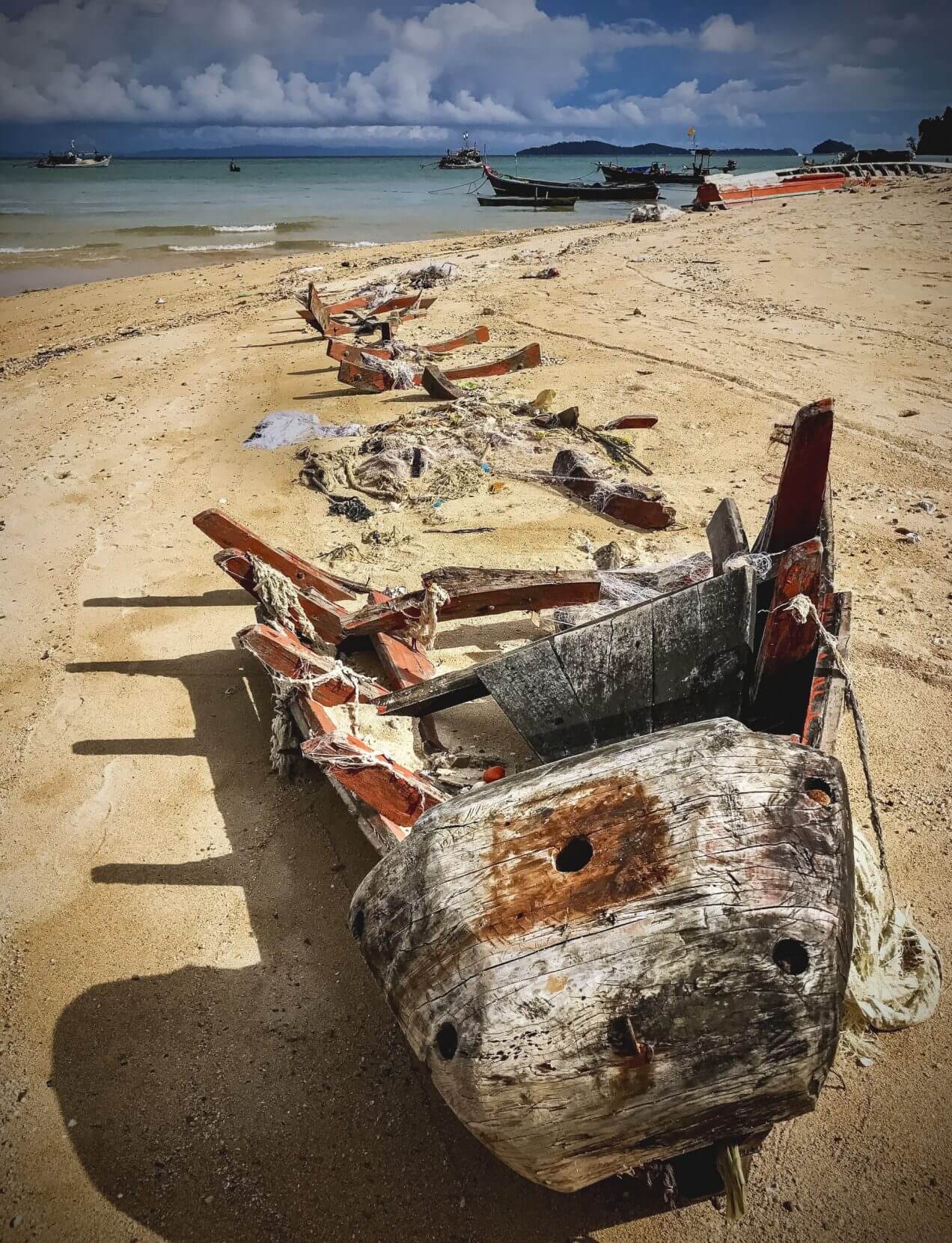
An abandoned boat is slowly reclaimed by the elements on the shores of Ma Kyone Galet. For the Moken, who live and die by the sea, survival is dependent on the vessels that carry them out. PHOTO: TANIA AMOCHAEV ROMANOV.
Many of the boats were elevated on rocks or boards and palm frond fires had been lit underneath. Men and women folded themselves into ampersand shapes around the fires, aiming plumes of smoke at the bottoms and sides of the boats. Smells of old oil and something gummy filled the air. I learned later that the process kills moths, cleans algae, and seals oil into the wood, beautifying it as a side effect.
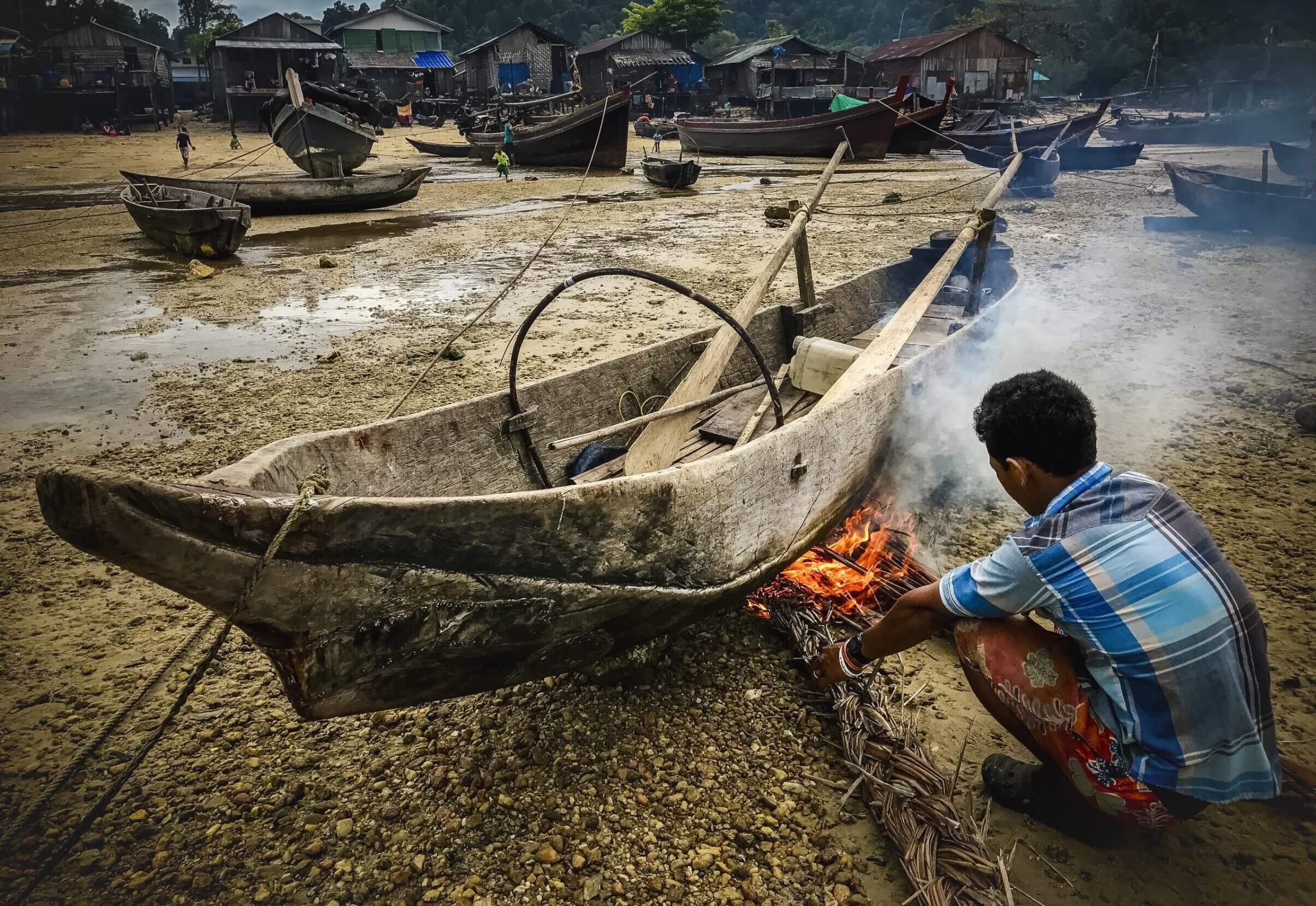
Below an elevated dugout canoe, a man burns palm fronds. The process burns off the algae and seals in the natural oils of the wood. PHOTO: TANIA AMOCHAEV ROMANOV.
The scene kept evolving as I shifted perspective. To one side, a narrow inlet, a few palm trees, intriguing reflections, a Buddhist pagoda backing up to the forest. The other way, a collage of boats stretched to houses on stilts. The sky played a continuously changing counterpoint to this symphony of impressions and the swirls of fanned smoke kept it all from settling into simple reality.
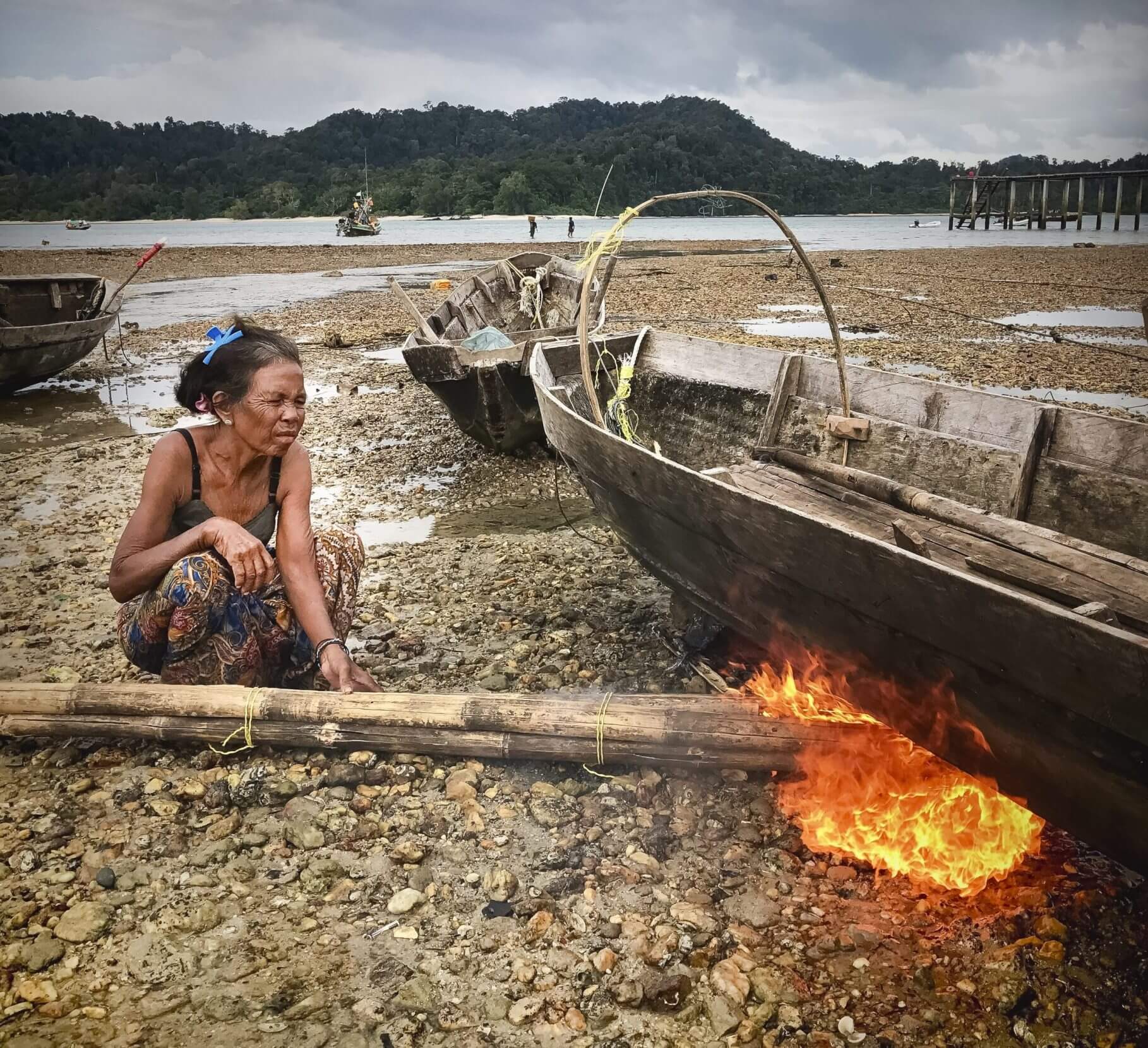
A woman burns palm fronds below an elevated boat. PHOTO: TANIA AMOCHAEV ROMANOV.
The workers laughed as I leaped around, splashing and pointing my camera at them. Eventually, when the tide started turning, I headed to the homes.
Crude huts of bamboo, tin, and tarps perched in the air with rickety decks all around them.
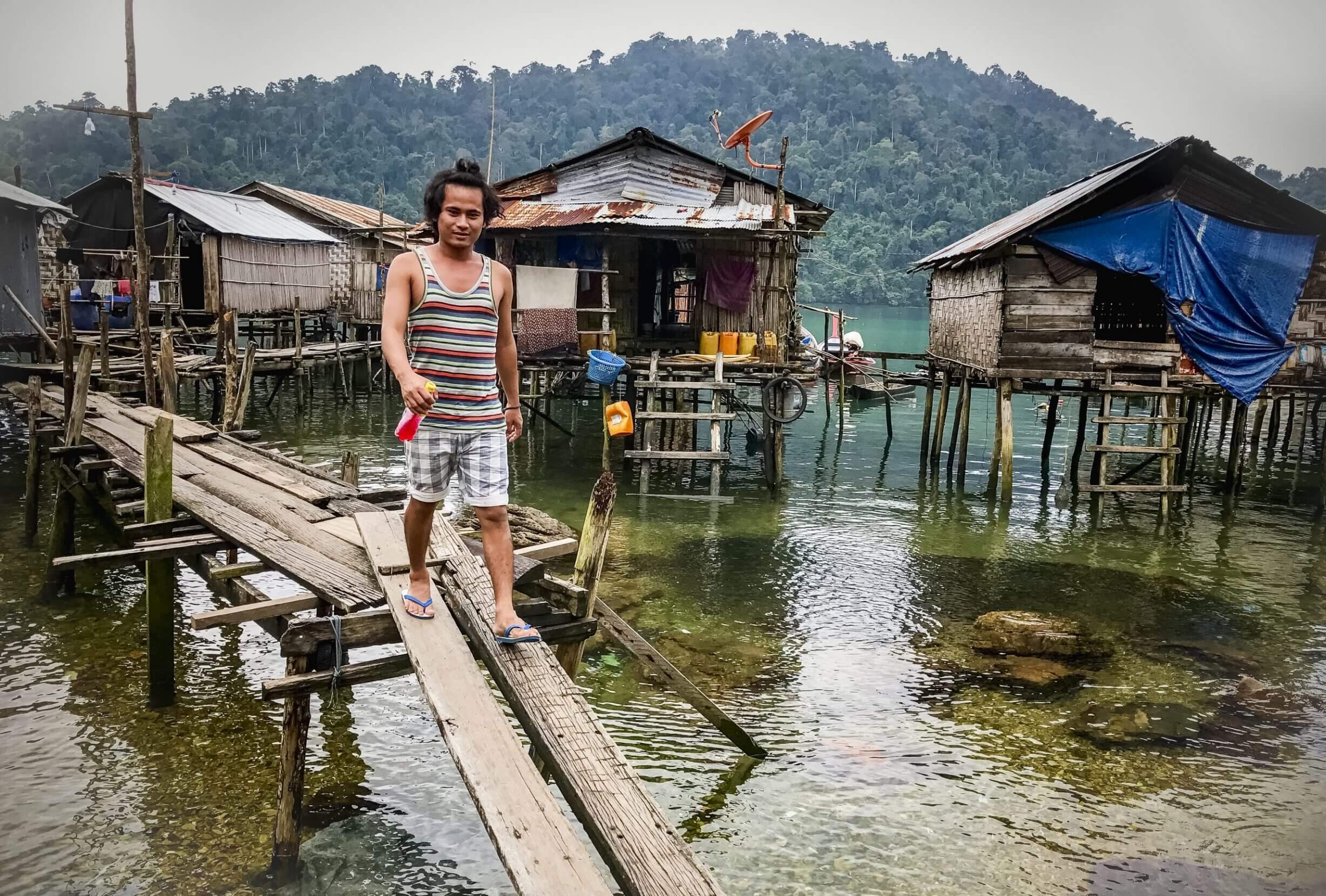
A man travels a walkway from a home built on stilts above the water. The Moken live on land now, but they remain tied to the sea. PHOTO: TANIA AMOCHAEV ROMANOV.
Fish hung from the eaves, drying.
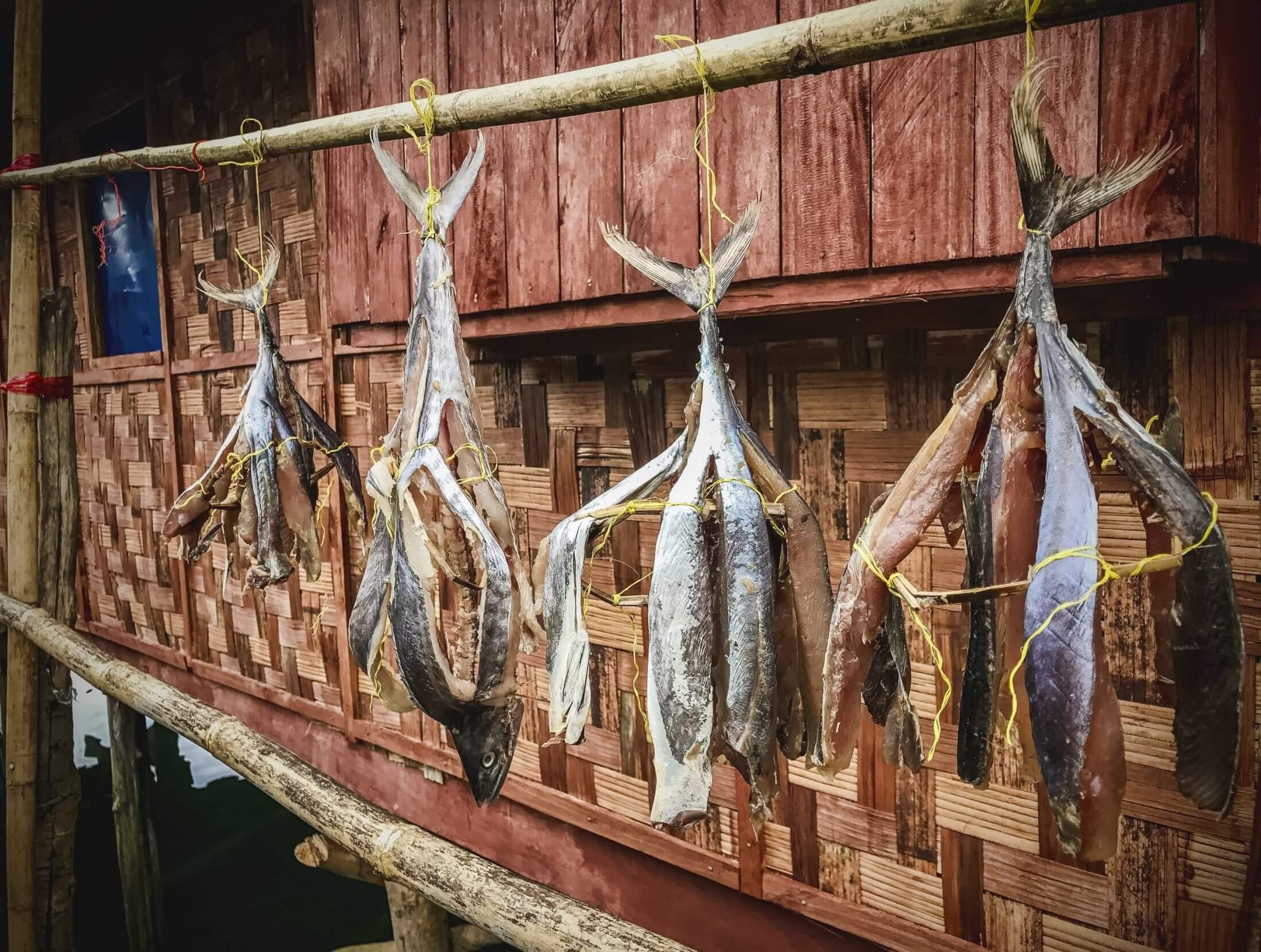
Fish hang from wooden rods attached to Moken homes to dry. PHOTO: TANIA AMOCHAEV ROMANOV.
A woman pulled snails out of the sand under her home. Another one filleted fresh flatfish.
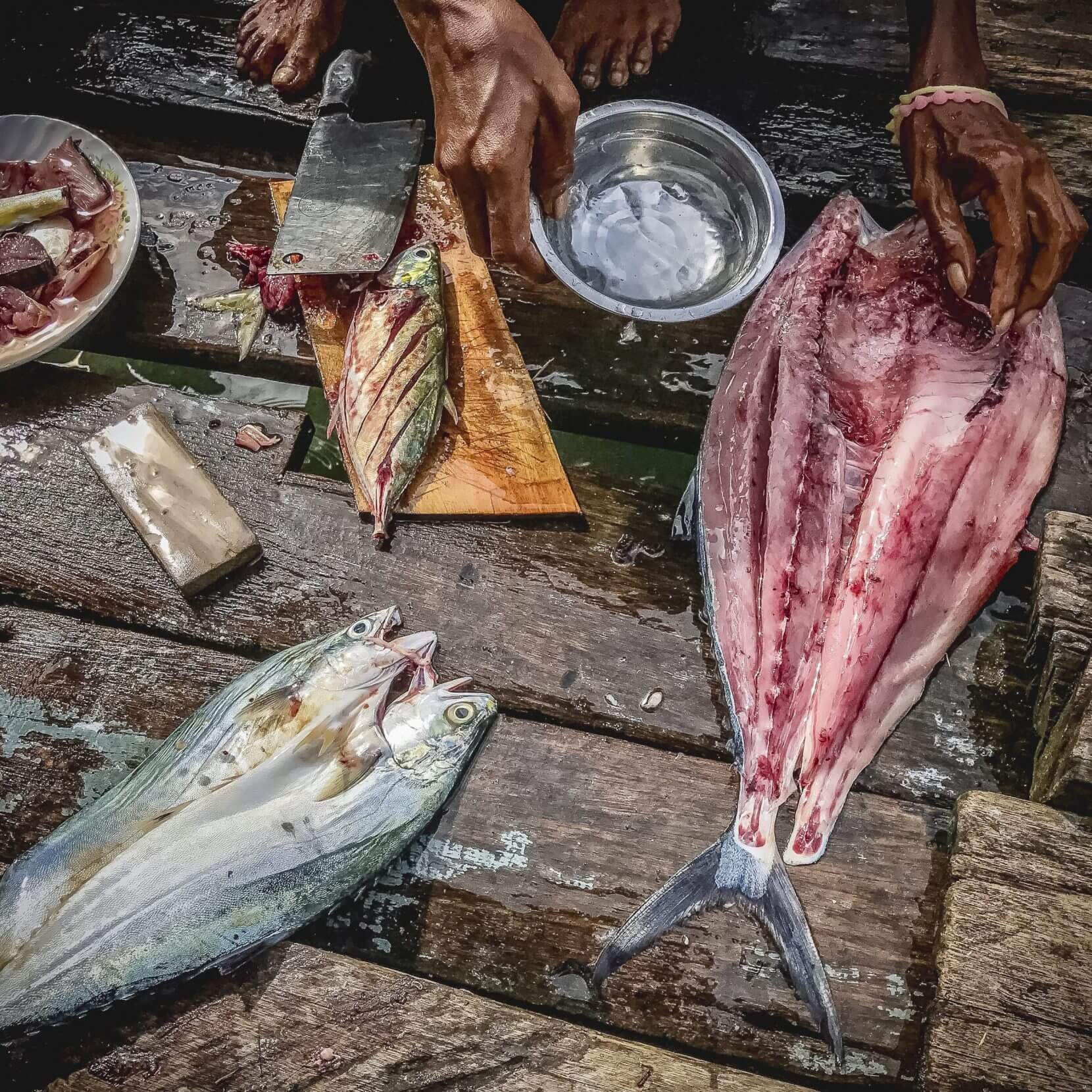
A woman fillets freshly caught fish on a wooden dock in Ma Kyone Galet. PHOTO: TANIA AMOCHAEV ROMANOV.
A young man soaped his body, grinning as he spied me.
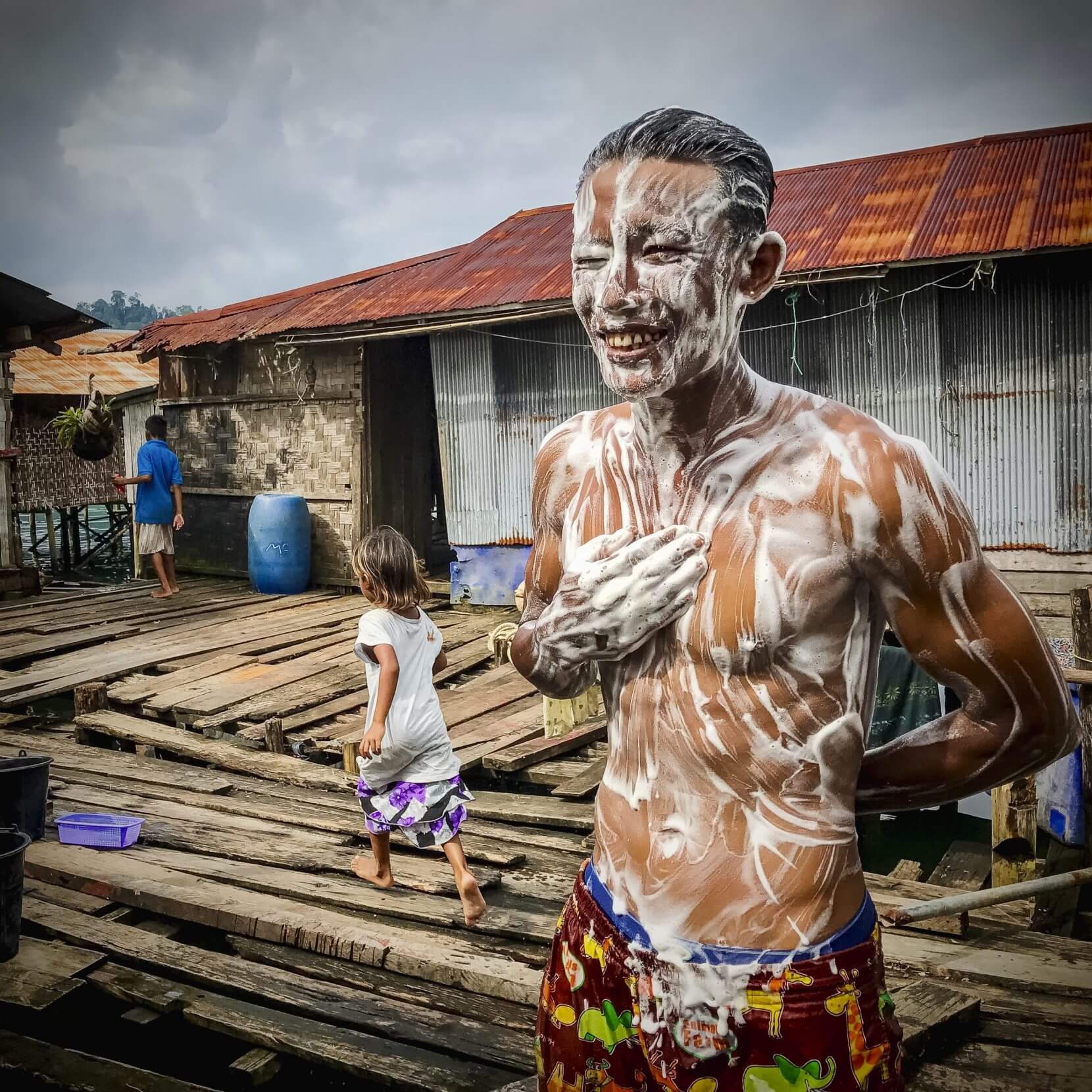
Covered in soap, a smiling man washes up. PHOTO: TANIA AMOCHAEV ROMANOV.
An old woman stepped from her home into my scene, both of us surprised at our meeting.
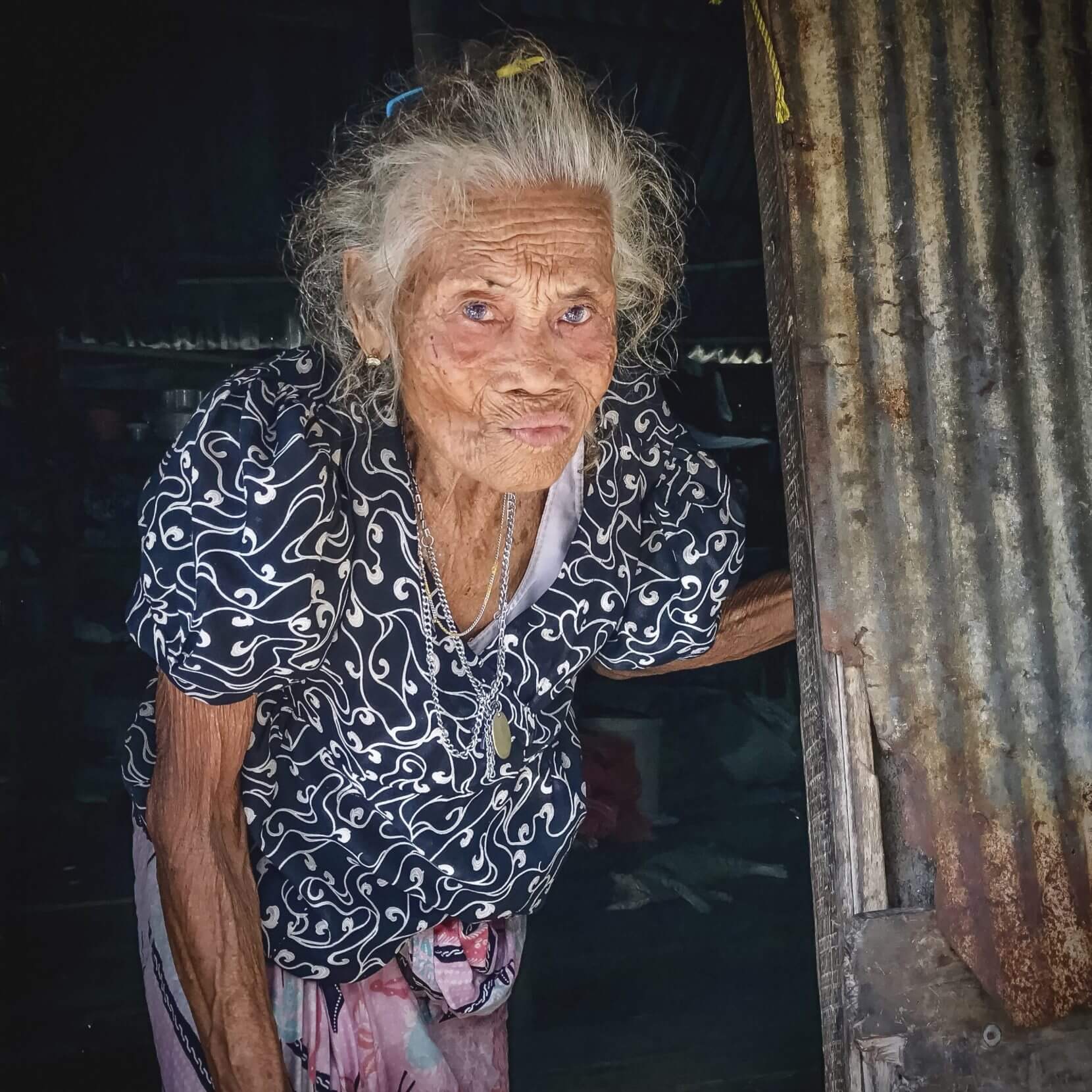
An elderly woman emerges from her home in Ma Kyone Galet. PHOTO: TANIA AMOCHAEV ROMANOV.
I wandered to the Buddhist temple on the Burmese side of town and watched a ceremony that involved taking a golden figure out on a boat. It was sparsely attended. Many more people gathered to watch the cockfight that followed after the golden God departed.
I heard laughter and peered into a dark space to see six glowing eyes gazing at me from squatting bodies in a dark repair shack. Three young men covered in grease and wearing dirty Western hand-me-downs worked on an old motor from one of the noisy longtail boats. They smiled as I caught their eyes, then returned to their work.
I dropped back to the sand at water’s edge and stumbled onto a group of women sitting on the ground, playing cards, and joyously betting and shouting, surrounded by children. Nearby, older children hauled in pails of water from the town pumps and then jumped about in the rising waters of the sea. Monks headed back to the temple. Delicate nets were being repaired everywhere I turned.

A young man repairs a delicate fishing net. PHOTO: TANIA AMOCHAEV ROMANOV.
And then the rain cleared. We headed back on the water, entering the realm of the Burmese — those with motorized boats rather than the handmade artifacts of an ancient way of life. A small fleet of longtail motorboats rested in a secluded inlet nearby, and we rowed out to visit them. They were waiting for the large ships to come purchase their catch and restock their ice. We were searching for fish for our dinner.
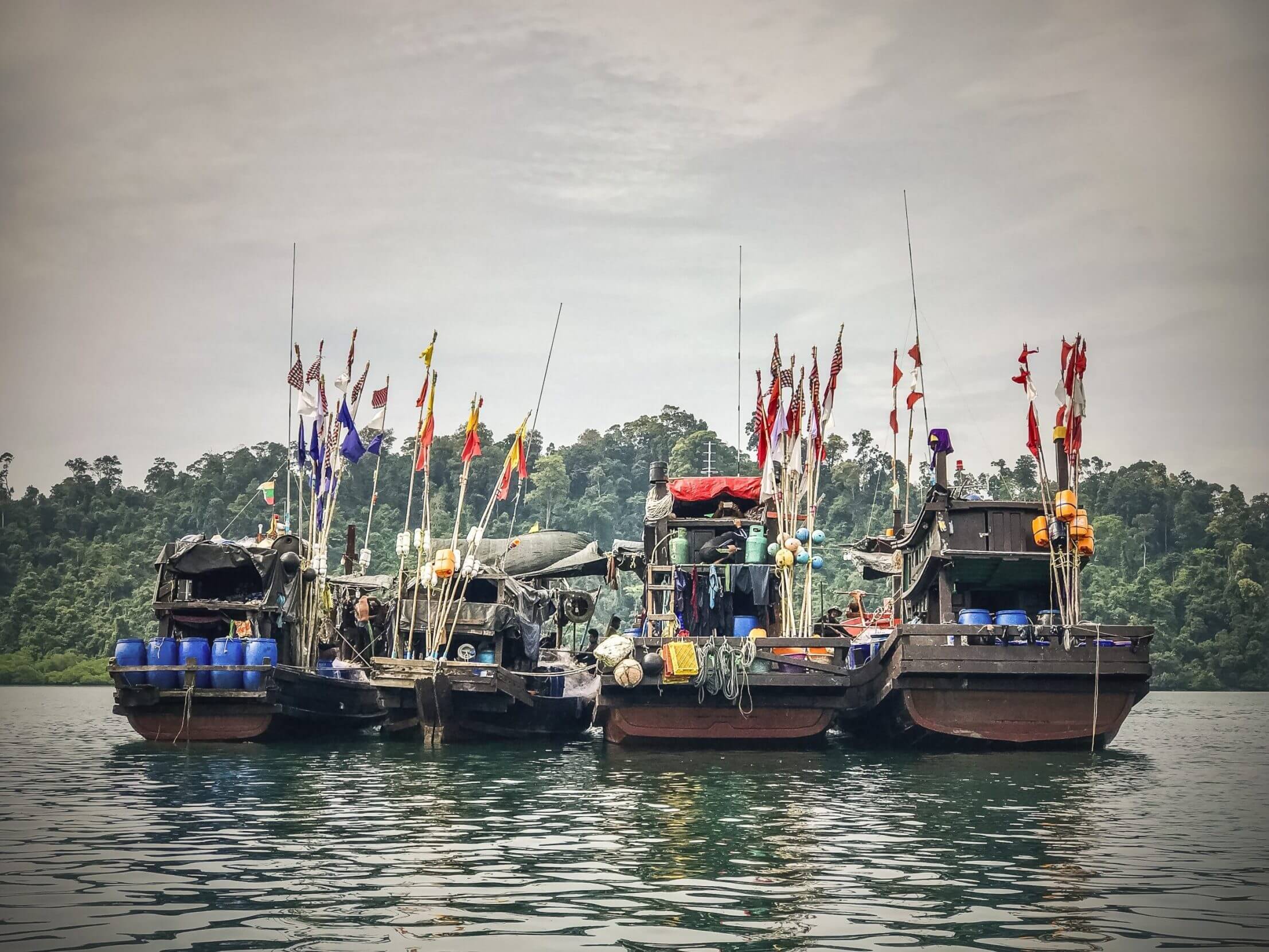
A small group of fisherman waits in a secluded cove for buyers. By nightfall, the fleet would grow tremendously. Overfishing in these waters threatens the once-rich food source of the Moken. PHOTO: TANIA AMOCHAEV ROMANOV.
The first boat we rowed to had a handful of foot-long fish in their hold, but we wanted a few more. A fisherman on the next ship pulled out a few beautiful flatfish, slightly shorter but wider. I leaned precariously over the hold to see more clearly and suddenly understood why the fishing nets were so fine. Stashed on ice were plastic crates of fragile, tiny squid. They were sorted by size — the largest no bigger than a finger. The local village had a couple of handfuls of large squid next to an old green scale, but these little delicacies were headed for the choicest markets of China or Japan.
As evening neared, the fleet grew exponentially. Our guide who had been here many times was shocked at the number of boats in the cove. At night, their strong lights seduced the fish into their nets. The beautiful sea is being fished out, and the traditional fishing of the Moken has no chance against this new armada.
And then we neared our ship and a dugout canoe with a young man at the oars approached.
“Would you like to see him dive?”
We certainly would.
~~
He arcs into that water, at one with the sea and the clouds.
I see him swimming in the deep, holding his breath, chasing the elusive fish, his eyes bright with magical underwater vision. I see him return with his catch to his family in their palm-frond covered boat, floating in an empty sea. I see his ancestors . . .
His sudden splash jerks me back to the present.
Those bright eyes are now covered with a modern underwater mask — a gift from a previous tourist. He is not bringing his dinner with him when he comes up for air. It is a performance. It is just for us. But as I watch the skill, grace, and elegance of this young man’s dance with the sea, the story of the Moken takes on a heartbreaking perspective.
He dove into a familiar deep.
Where, I wonder, as I gaze at those shifting seas, will he emerge?
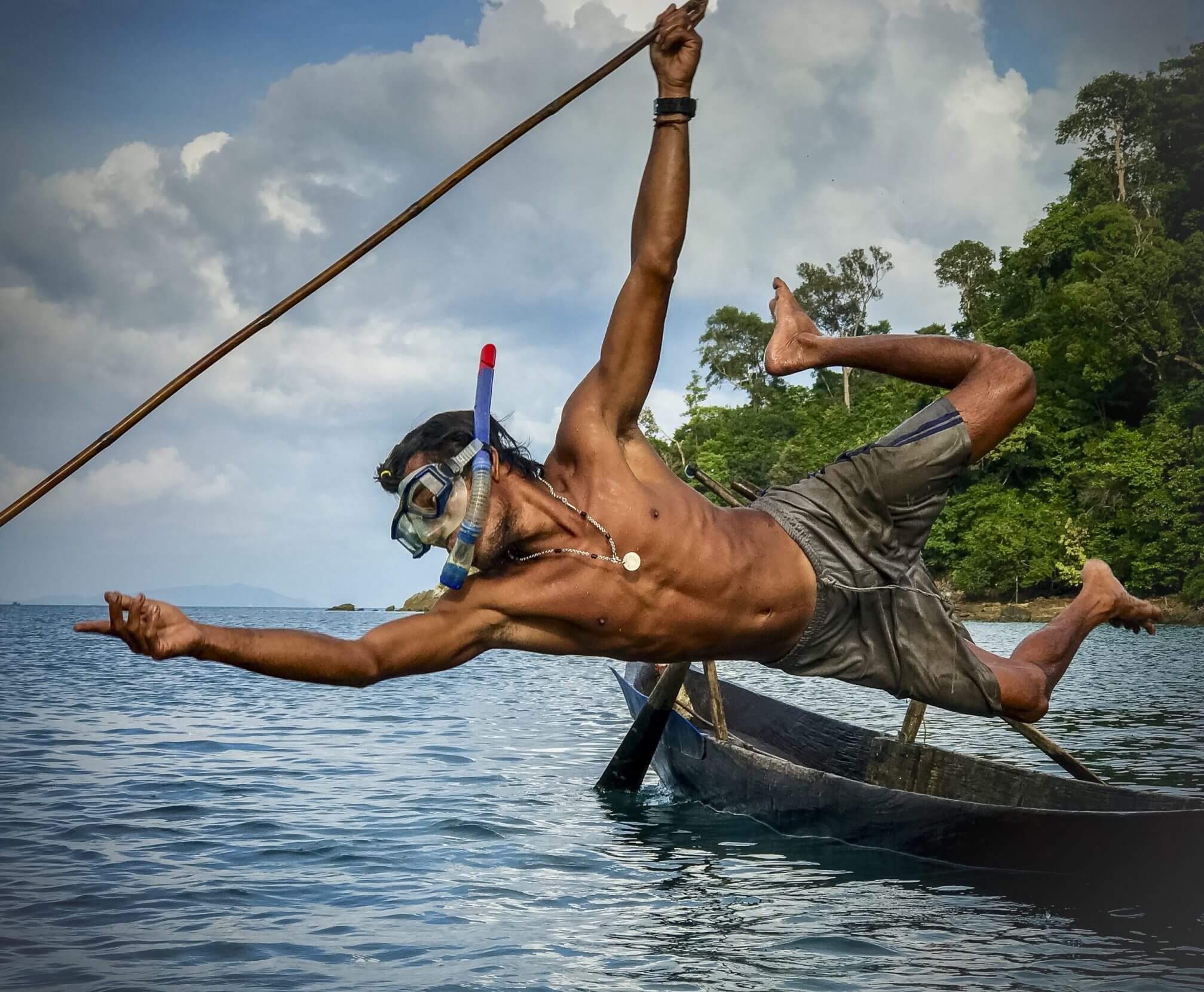
With modern accouterments, a young Moken man demonstrates the fishing technique of his ancestors as he dives into the water. But unlike his ancestors, he won’t return with a fish. PHOTO: TANIA AMOCHAEV ROMANOV.
Tania Amochaev Romanov
Award-winning travel writer and photographer Tania Romanov made her first international trip at six months old — as a refugee — and hasn't stopped traveling since.

